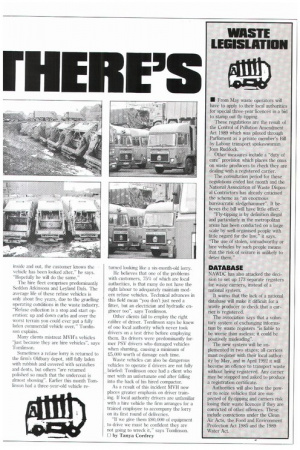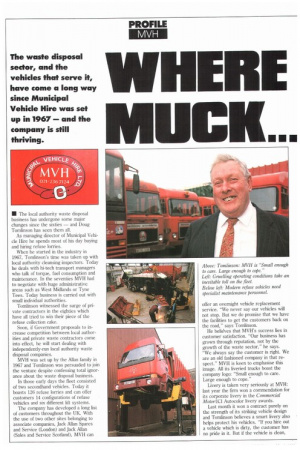11E11
Page 45

Page 44

If you've noticed an error in this article please click here to report it so we can fix it.
SS
• The local authority waste disposal business has undergone some major changes since the sixties — and Doug Tomlinson has seen them all As managing director of Municipal Vehicle Hire he spends most of his day buying and hiring refuse lorries.
When he started in the industry in 1967, Tomlinson's time was taken up with local authority cleansing inspectors. Today he deals with hi-tech transport managers who talk of torque, fuel consumption and maintenance. In the seventies MVH had to negotiate with huge administrative areas such as West Midlands or Tyne Tees. Today business is carried out with small individual authorities.
Tomlinson witnessed the surge of private contractors in the eighties which have all tried to win their piece of the refuse collection cake.
Soon, if Government proposals to increase competition between local authorities and private waste contractors come into effect, he will start dealing with independently-run local authority waste disposal companies.
MVH was set up by the Allan family in 1967 and Tomlinson was persuaded to join the venture despite confessing total ignorance about the waste disposal business.
In those early days the fleet consisted of two secondhand vehicles. Today it boasts 126 refuse lorries and can offer customers 14 configurations of refuse vehicles and six different lift systems.
The company has developed a long list of customers throughout the UK. With the use of two other sites belonging to associate companies, Jack Allan Spares and Service (London) and Jack Allan (Sales and Service Scotland), MVH can Above: Tomlinson: MVH is "Small enough to care. Large enough to cope."
Left: Gruelling operating conditions take an inevitable toll on the fleet.
Below left: Modern refuse vehicles need specialist maintenance personnel.
offer an overnight vehicle replacement service. "We never say our vehicles will not stop. But we do promise that we have the facilities to get the customers back on the road," says Tomlinson.
He believes that MVH's success lies in customer satisfaction. "Our business has grown through reputation, not by the growth of the waste sector," he says. "We always say the customer is right. We are an old fashioned company in that respect." MVH is keen to emphasise this image. All its liveried trucks boast the company logo: "Small enough to care. Large enough to cope," Livery is taken very seriously at MVH: last year the firm won a commendation for its corporate livery in the Commercial Motor/ICI Autocolor livery awards.
Last month it won a contract purely on the strength of its striking vehicle design and Tomlinson believes a smart livery also helps protect his vehicles. "If you hire out a vehicle which is dirty, the customer has no pride in it. But if the vehicle is clean, inside and out, the customer knows the vehicle has been looked after," he says. "Hopefully he will do the same."
The hire fleet comprises predominantly Seddon Atkinsons and Leyland Dafs. The average life of these refuse vehicles is only about five years, due to the gruelling operating conditions in the waste industry. "Refuse collection is a stop and start operation: up and down curbs and over the worst terrain you could ever put a fully laden commercial vehicle over," Tomlinson explains.
Many clients mistreat MVH's vehicles "just because they are hire vehicles", says Tomlinson.
Sometimes a refuse lorry is returned to the firm's Oldbury depot, still fully laden with rubbish and covered with scratches and dents, but others "are returned polished so much that the undercoat is almost showing". Earlier this month Tomlinson had a three-year-old vehicle re
turned looking like a six-month-old lorry.
He believes that one of the problems with customers, 75% of which are local authorities, is that many do not have the right labour to adequately maintain modern refuse vehicles. Technical advances in this field mean "you don't just need a fitter, but an electrician and hydraulic engineer too", says Tomlinson.
Other clients fail to employ the right calibre of driver. Tomlinson says he knew of one local authority which never took drivers on a test drive before employing them. Its drivers were predominantly former PSV drivers who damaged vehicles when shunting, causing a minimum of £5,000 worth of damage each time.
Waste vehicles can also be dangerous vehicles to operate if drivers are not fully briefed: Tomlinson once had a client who met with an unfortunate end after falling into the back of his hired compactor.
As a result of this incident MVH now places greater emphasis on driver train. ing. If local authority drivers are unfamiliar with a hire vehicle the firm arranges for a trained employee to accompany the lorry on its first round of deliveries.
"If we give them £80,000 of equipment to drive we must be confident they are not going to wreck it," says Tomlinson. 1:1 by Tanya Cordrey 111 From May waste operators will have to apply to their local authorities for special three-year 'licences in a bid to stamp out fly-tipping.
These regulations are the result of the Control of Pollution Amendment Act 1989 which was piloted through Parliament as a private member's Bill by Labour transport spokeswoman Joan Ruddock.
Other measures include a "duty of care" provision which places the onus on waste producers to check they are dealing witha registered carrier.
The consultation period for these regulations ended last month and the National Association of Waste Disposal Contractors has already criticised the scheme as "an enormous bureaucratic sledgehammer". It believes the bill will have little effect.
"Fly-tipping is by definition illegal and particularly in the metropolitan areas has been conducted on a large scale by well organised people with little regard for the law," it says. "The use of stolen, unroadworthy or hire vehicles by such people means thatthe risk of seizure is unlikely to deter them.
DATABASE
NAWDC has also attacked the decision to set up 173 separate registers for waste carriers, instead of a national system.
It warns that, the lack of a national database will make it difficult for a waste producer to check that a carrier is registered.
The association says that a voluntary system of exchanging information by waste registers "is liable to be worse than useless; it could be positively misleading".
The new system will be implemented in two stages; all carriers must register with their local authority by May, and in April 1992 it will become an offence to transport waste without being registered. Any carrier may hestopped and asked to produce a registration certificate.
Authorities will also have the power to seize vehicles that are suspected of fly-tipping and carriers risk losing their waste licences if they are convicted of other offences. These include convictions under the Clean Air Acts, the Food and Environment Protection Act 1985 and the 1989 Water Act.




















































































